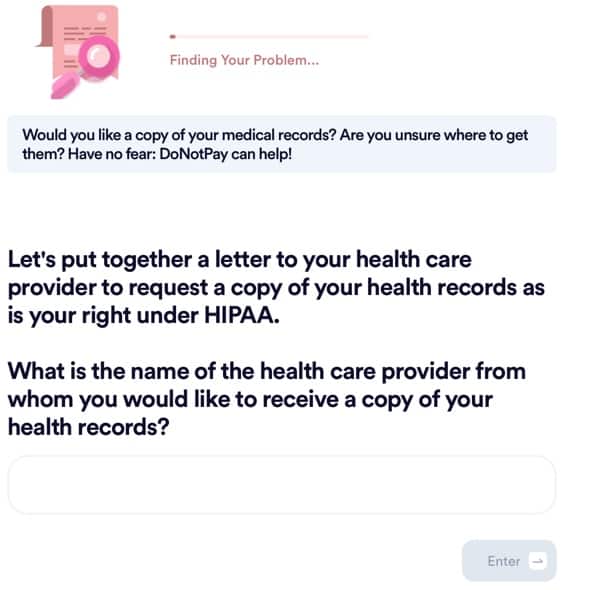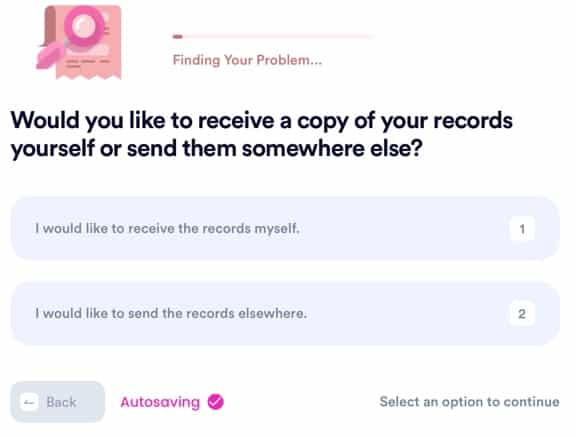How to Get Medical Records from 30 Years Ago
Whenever you visit the doctor, they listen to you while scribbling down some notes and then proceed to the next steps of your treatment. However, you may not know precisely what is behind the clipboard unless you review your medical records.
Federal and StateState laws, including the Health Insurance Portability and Accountability Act, gives you the right to access all your medical records, no matter how old they are. Fortunately, hospitals have an archive where they keep old medical records, even up to 30 years ago.
Getting your may be as easy as requesting your hospital for them or digging deep into the archives to find them. But, while you can go on the hunt by yourself and retrieve them, DoNotPay can help ease your hassle and help you find your medical records through the new product.
Why Might You Need Copies of Your Medical Records from 30 Years Ago?
According to HIPAA, your medical records are your property, and it's your right to have them. Therefore, you can request them whenever you need them.
Here are some reasons you might need your medical records.
- To check some procedures you may have undertaken years ago that could contribute to your current health condition or avoid repeating them.
- To monitor your health care pattern through the years.
- If you need to transfer all your past health records to your new doctor, especially if your doctor is retiring or you have moved to another healthcare provider.
- To inform your relatives or anyone concerned about our health condition, especially if you need their help.
- To help you apply for any health and age-based support from the state or federal governments.
- To check the medical history of a relative who has already passed on, especially if needed to solve some impending issues.
How to Get Medical Records from 30 Years Ago by Yourself
Laws governing medical records and how long they should be kept are not uniform across the states, and so each StateState may have a different timeline. However, most states require hospitals to keep medical records for at least 5-10 years after the last treatment, discharge, or death.
Hospitals with an archive section may keep the record longer, even up to over 30 years. Better still, with the tremendous technological advancements, most hospitals can keep medical records in digital format, therefore preserving the records for a long time.
You can access your 30-year-old medical records through the following steps.
- Contact the hospital to find out if they have records dating over 30 years ago.
- Find out the hospital's procedure for getting your medical records
- Fill out the hospital's authorization form and submit it with your request.
- Pay any fees associated with getting such old records.
Some hospitals may have kept all their records digitally after the introduction of online storage, while others may not have migrated all their records online.
Since the hospital may have to go deep into the archives to try and find your medical records, you may need to wait longer than if you are requesting recent records.
In the unfortunate event that you don't find them at the hospital, you may need to go deeper and try to contact your retired doctor for any leads or even your parents and other relatives. Who knows, they might have some with them.
Who Do I Contact If I Need My Military or Veteran Medical Records?
Here's a guide to help you navigate military or veteran medical records transfers and requests.
| Branch | Date Discharged or Retired | Request Records From | Contact Information |
| Army | 10/16/1992 to 12/31/2013 | Department of VA
Records Management Center Department of Veterans Affairs | ATTN: Release of Information Claims Intake Center
P.O. Box 4444 Janesville, WI 53547 |
| Navy | 01/31/1994 to 12/31/2013 | Department of VA
Records Management Center Department of Veterans Affairs | ATTN: Release of Information Claims Intake Center
P.O. Box 4444 Janesville, WI 53547 |
| Air Force | 05/01/1994 to 12/31/2013 | Department of VA
Records Management Center | Department of Veterans Affairs
ATTN: Release of Information Claims Intake Center P.O. Box 4444 Janesville, WI 53547 |
| Marine Corps | 05/01/1994 to 12/31/2013 | Department of VA
Records Management Center Department of Veterans Affairs | ATTN: Release of Information Claims Intake Center
P.O. Box 4444 Janesville, WI 53547 On or after 01/01/2014 BUMED Navy Medicine Records Activity Navy Medicine Records Activity (NMRA) |
| Coast Guard | 04/01/1998 to 09/30/2014 | Department of VA
Records Management Center Department of Veterans Affairs | ATTN: Release of Information Claims Intake Center
P.O. Box 4444 Janesville, WI 53547 |
How to Get Medical Records from 30 Years Ago With the Help of DoNotPay
Whether you are getting your own medical records or as a third party on behalf of an elderly person or one who has already passed on, you'll be required to have the right documentation before you can get access to the records.
If the hospital has records dating as far as 30 years ago, your request will be processed like other records and delivered to you in your preferred delivery method.
If this sounds like too much work for you, DoNotPay has a product that can help you send in your request to the hospital and get you the medical records in a few weeks.
Here's how DoNotPay works.
- Look up

- Enter the name of the health care provider you’d like to receive medical records from.

- Answer a few questions about your provider and where you’d like to send the records.

And that's it! DoNotPay will send your request for medical records to your health care provider within a few days, and you should have your records received within a few weeks!
What Else Can DoNotPay Do?
Other than finding your old records and those from your childhood, DoNotPay can help you in different areas. Some of the areas DoNotPay can help include the following.
- Medical Records
- Electronic Health Records
- Medical Records Release form
- Kaiser medical records
- How to request medical records
- How long are medical records kept?
- Mercy medical records
- How to get my medical records
- Baptist medical records
- Cleveland Clinic medical records
Check out DoNotPay's Request Medical Records product for more information.


